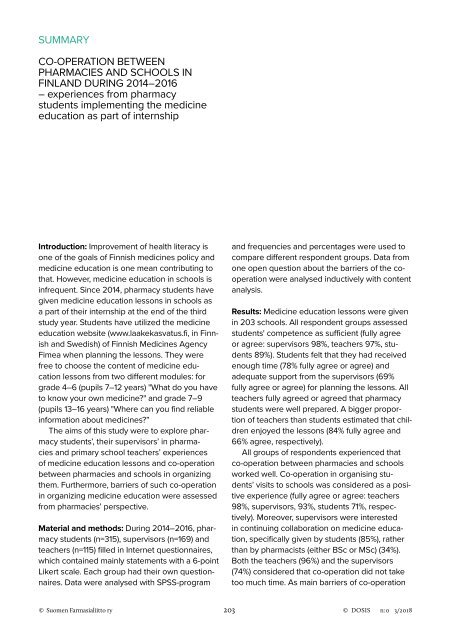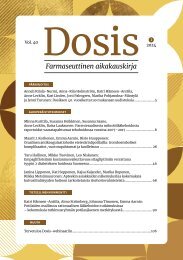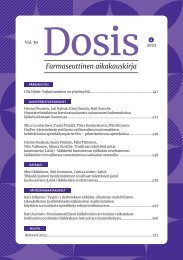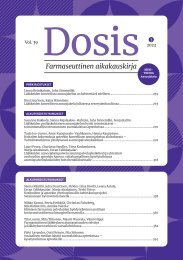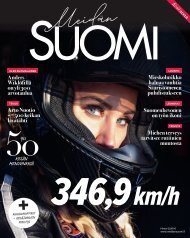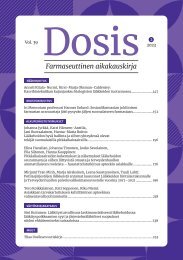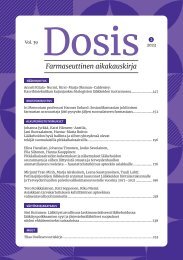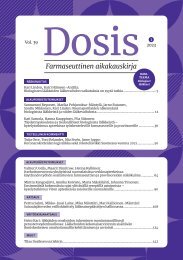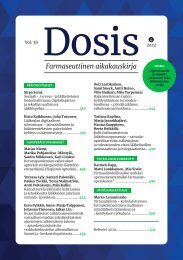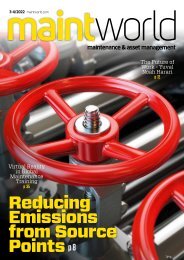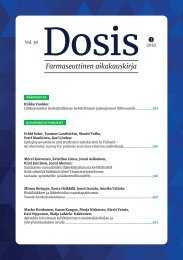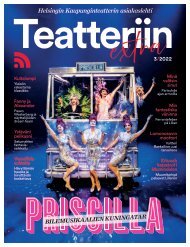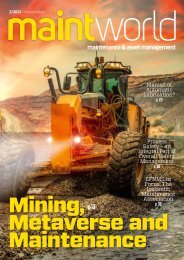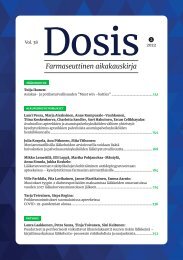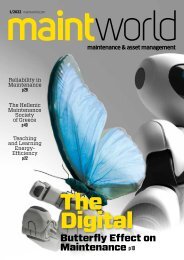Dosis 3/2018
Farmaseuttinen aikakauskirja DOSIS 3/2018 vol.43 Suomen Farmasialiitto ry
Farmaseuttinen aikakauskirja DOSIS 3/2018 vol.43 Suomen Farmasialiitto ry
- No tags were found...
You also want an ePaper? Increase the reach of your titles
YUMPU automatically turns print PDFs into web optimized ePapers that Google loves.
SUMMARY<br />
CO-OPERATION BETWEEN<br />
PHARMACIES AND SCHOOLS IN<br />
FINLAND DURING 2014–2016<br />
– experiences from pharmacy<br />
students implementing the medicine<br />
education as part of internship<br />
Introduction: Improvement of health literacy is<br />
one of the goals of Finnish medicines policy and<br />
medicine education is one mean contributing to<br />
that. However, medicine education in schools is<br />
infrequent. Since 2014, pharmacy students have<br />
given medicine education lessons in schools as<br />
a part of their internship at the end of the third<br />
study year. Students have utilized the medicine<br />
education website (www.laakekasvatus.fi, in Finnish<br />
and Swedish) of Finnish Medicines Agency<br />
Fimea when planning the lessons. They were<br />
free to choose the content of medicine education<br />
lessons from two different modules: for<br />
grade 4–6 (pupils 7–12 years) "What do you have<br />
to know your own medicine?" and grade 7–9<br />
(pupils 13–16 years) "Where can you find reliable<br />
information about medicines?”<br />
The aims of this study were to explore pharmacy<br />
students’, their supervisors’ in pharmacies<br />
and primary school teachers’ experiences<br />
of medicine education lessons and co-operation<br />
between pharmacies and schools in organizing<br />
them. Furthermore, barriers of such co-operation<br />
in organizing medicine education were assessed<br />
from pharmacies’ perspective.<br />
Material and methods: During 2014–2016, pharmacy<br />
students (n=315), supervisors (n=169) and<br />
teachers (n=115) filled in Internet questionnaires,<br />
which contained mainly statements with a 6-point<br />
Likert scale. Each group had their own questionnaires.<br />
Data were analysed with SPSS-program<br />
and frequencies and percentages were used to<br />
compare different respondent groups. Data from<br />
one open question about the barriers of the cooperation<br />
were analysed inductively with content<br />
analysis.<br />
Results: Medicine education lessons were given<br />
in 203 schools. All respondent groups assessed<br />
students' competence as sufficient (fully agree<br />
or agree: supervisors 98%, teachers 97%, students<br />
89%). Students felt that they had received<br />
enough time (78% fully agree or agree) and<br />
adequate support from the supervisors (69%<br />
fully agree or agree) for planning the lessons. All<br />
teachers fully agreed or agreed that pharmacy<br />
students were well prepared. A bigger proportion<br />
of teachers than students estimated that children<br />
enjoyed the lessons (84% fully agree and<br />
66% agree, respectively).<br />
All groups of respondents experienced that<br />
co-operation between pharmacies and schools<br />
worked well. Co-operation in organising students’<br />
visits to schools was considered as a positive<br />
experience (fully agree or agree: teachers<br />
98%, supervisors, 93%, students 71%, respectively).<br />
Moreover, supervisors were interested<br />
in continuing collaboration on medicine education,<br />
specifically given by students (85%), rather<br />
than by pharmacists (either BSc or MSc) (34%).<br />
Both the teachers (96%) and the supervisors<br />
(74%) considered that co-operation did not take<br />
too much time. As main barriers of co-operation<br />
© Suomen Farmasialiitto ry 203<br />
© DOSIS n:0 3/<strong>2018</strong>


